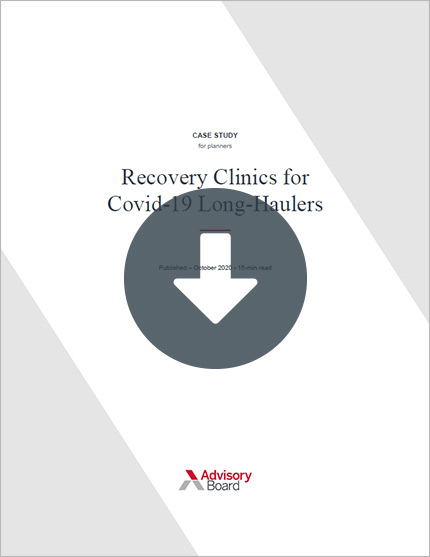Auto logout in seconds.
Continue LogoutMore than a year after being hospitalized with Covid-19, Cassandra Hernandez, a former nurse, still hasn't been able to return to work because of neurological issues—and researchers worry that cases like hers may be an early sign of a link between Covid-19 and diseases such as Alzheimer's, Jon Hamilton reports for NPR's "Shots."
Recovery clinics for Covid-19 long-haulers
'I forgot how to use a fork'
Before she contracted Covid-19 in June 2020, Hernandez worked as a nurse earning her master's degree, and she said she would have described herself as being mentally and physically fit.
After being hospitalized with Covid-19, however, Hernandez said she experienced tremors, extreme fatigue, and memory struggles. "I would literally fall asleep if I was having a conversation or doing anything that involved my brain," she said.
Now, more than a year later, the 38-year-old's brain is still "foggy," and she's struggling to remember basic practices, Hamilton reports.
"We were at dinner, and I forgot how to use a fork," Hernandez said. "It was embarrassing. … Before this I was working on my master's. Now I can do basic math, addition and subtraction, I can read at a fifth-grade level. I'm still working hard every day."
What early research suggests about Covid-19 and long-term cognitive issues
Alarmed by cases such as Hernandez's, researchers this week are presenting new research at the Alzheimer's Association International Conference on whether Covid-19 elevates the risk of Alzheimer's disease.
The research is in its early stages, experts emphasized. Because the coronavirus emerged only in 2019, researchers haven't had time to follow patients for years to determine how Covid-19 affects their Alzheimer's risk. Still, researchers say there are early reasons for concern.
PET scans taken before and after people develop Covid-19, for instance, suggest that the virus causes changes in the brain that overlap with those seen in Alzheimer's patients. Additionally, Hamilton reports, genetic studies have found that some of the same genes that produce an increased susceptibility to "severe Covid" also increase the risk of developing Alzheimer's.
Gabriel de Erausquin, a professor of neurology at UT Health San Antonio, said he and his colleagues have found that mental issues tend to present more often among Covid-19 patients who have experienced a loss of smell, potentially because the disease affects the brain's olfactory bulb.
"Persistent lack of smell, it's associated with brain changes not just in the olfactory bulb but those places that are connected one way or another to the smell sense," such as the regions of the brain involved in thinking, planning, memory, and mood, de Erausquin said. "It's downright scary," he added.
However, de Erausquin said Covid-19's effect on the brain appeared to vary depending on the patient's age. While those in their 30s tended to develop mood disorders such as depression or anxiety, "the foremost manifestation" among patients 60 and older "is forgetfulness," he said.
Even the possibility that Covid-19 could increase the odds of developing Alzheimer's is worrisome, Sudha Seshadri, founding director of the Glenn Biggs Institute for Alzheimer's and Neurodegenerative Diseases at UT Health San Antonio, said. "Even if the effect is small, it's something we're going to have to factor in because the population is quite large," he said.
But, de Erausquin said, "the true answer is we don't know" whether these patients' conditions will deteriorate in the same way Alzheimer's patients do.
For her part, Hernandez has been working with Monica Verduzco-Gutierrez, chair of the department of physical medicine and rehabilitation at UT Health and director of the Covid-19 recovery clinic, to restore her cognitive abilities.
According to Verduzco-Gutierrez, the most common complaint she's received among Covid-19 patients is fatigue, as well as migraines, forgetfulness, and balance issues.
And although Verduzco-Gutierrez said some of her patients never fully recover, she is hopeful for Hernandez. "She's made so much improvement and I would love for her to go back to nursing," she says. "But again, we don't know what happens with this disease." (Hamilton, "Shots," NPR, 7/26)
Download the case study

Several health systems have set up dedicated recovery clinics to help treat and coordinate care for long-haulers. This resource provides an overview of Covid-19 recovery clinic models pioneered by two early adopters—The University of Iowa Hospitals and Clinics and the University of Pennsylvania Medicine—and considerations for assessing whether it is a model you should pursue.
Don't miss out on the latest Advisory Board insights
Create your free account to access 1 resource, including the latest research and webinars.
Want access without creating an account?
You have 1 free members-only resource remaining this month.
1 free members-only resources remaining
1 free members-only resources remaining
You've reached your limit of free insights
Become a member to access all of Advisory Board's resources, events, and experts
Never miss out on the latest innovative health care content tailored to you.
Benefits include:
You've reached your limit of free insights
Become a member to access all of Advisory Board's resources, events, and experts
Never miss out on the latest innovative health care content tailored to you.
Benefits include:
This content is available through your Curated Research partnership with Advisory Board. Click on ‘view this resource’ to read the full piece
Email ask@advisory.com to learn more
Click on ‘Become a Member’ to learn about the benefits of a Full-Access partnership with Advisory Board
Never miss out on the latest innovative health care content tailored to you.
Benefits Include:
This is for members only. Learn more.
Click on ‘Become a Member’ to learn about the benefits of a Full-Access partnership with Advisory Board
Never miss out on the latest innovative health care content tailored to you.
